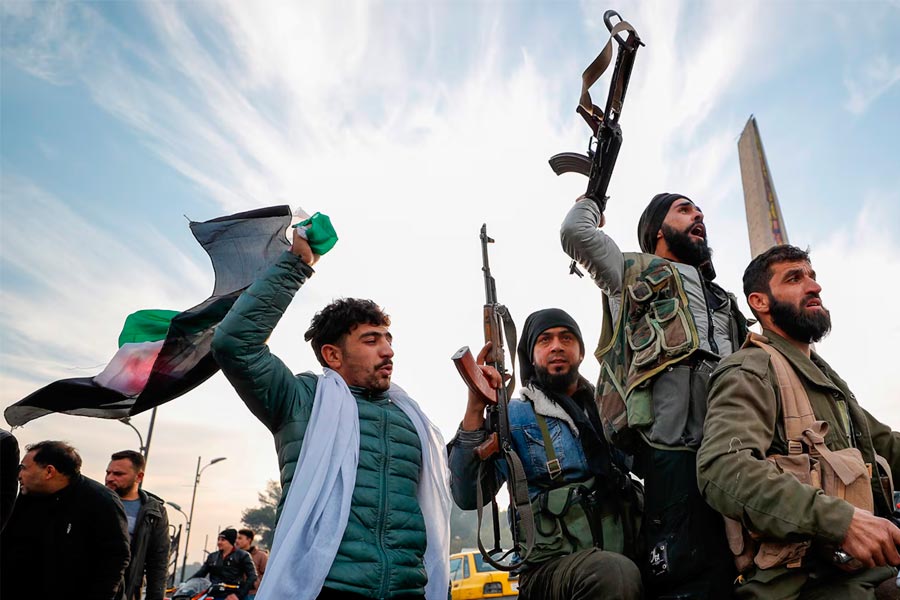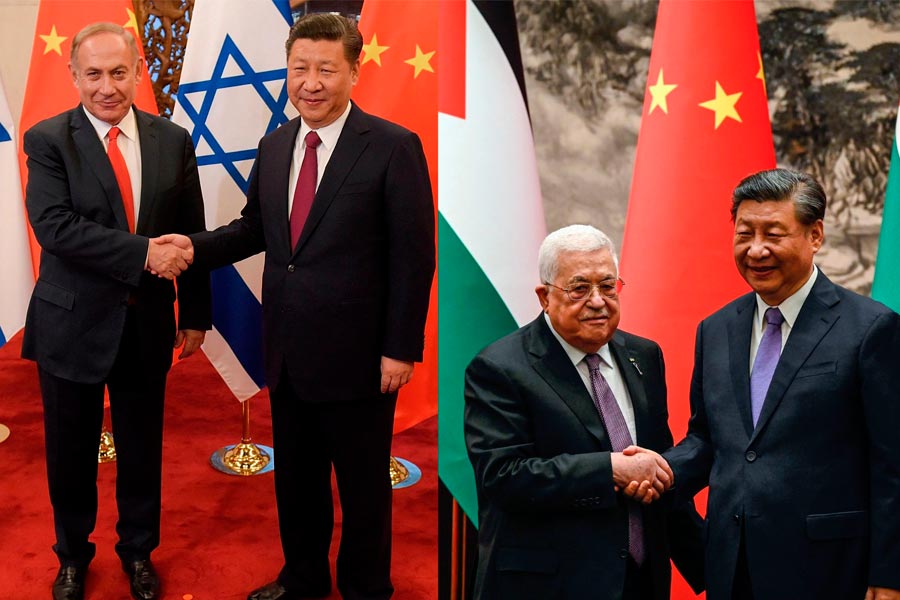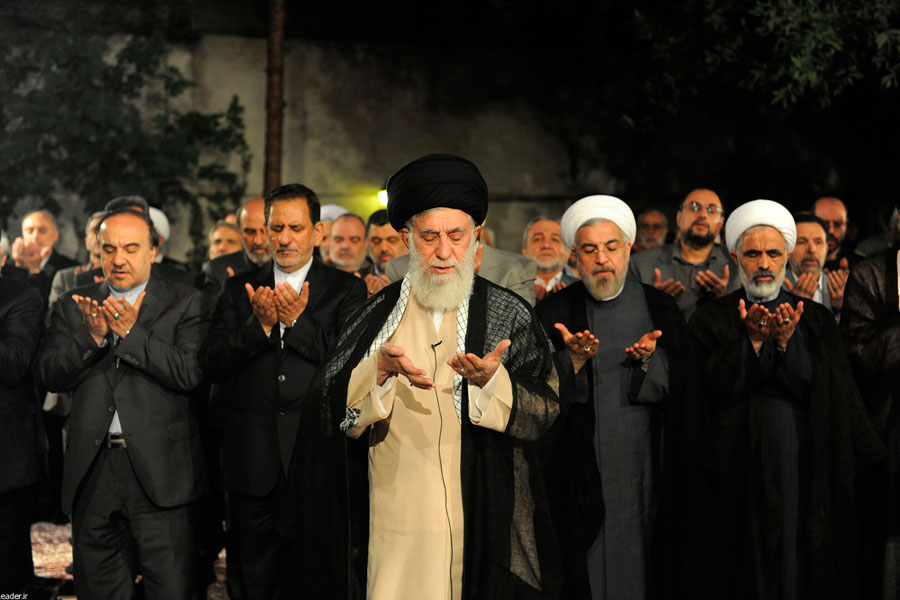What works and what doesn't in the fight against Zionism and imperialism?
The sudden fall of the Al-Assad regime at the hands of the jihadist militias of HTS, financed, armed and supported by Turkey and the US, has shaken the chessboard of the Middle East and dealt a heavy blow to Iran, Russia and China. The possibility that this key country, bled dry by a civil war sponsored by the West, will finally swing into the orbit of influence of Washington, Ankara and Tel Aviv, underlines the fierce nature of the battle for world hegemony. [1]
The media whitewashing that has taken place in Syria is not lost on anyone. In a propaganda operation designed by the CIA and the rest of the Western intelligence agencies, and with the active support of the media that has put all its manipulation tricks at their service, the former fundamentalist militias that split off from Al Qaeda, and which until very recently were included in the list of terrorist organisations of the US and the EU, have come to be praised as “insurgent” forces that have liberated Syria from a ferocious dictatorship, and are now preparing to embark on the path of political normalisation.
In this way, the leader of the HTS, Abu Mohammed al-Julani, has changed his fundamentalist aesthetic to recycle himself into a kind of freedom fighter, who wears Western suits without the slightest problem, and gives interviews to CNN, the BBC and all kinds of reliable agencies in which he proposes a roadmap of moderation and search for consensus: from the convening of a "Constituent Assembly" and the drafting of a new constitution, to the formation of an army that respects the religious diversity of the country and where all national minorities are represented.
A fairy tale for the consumption of international public opinion in order to keep its eyes away from what is really happening behind the scenes: the territorial division of the country into different zones of influence under the control of the United States, Turkey, and also Israel, the Zionist and colonialist power that has carried out hundreds of military operations to destroy 80% of Syria's military capabilities, consolidate its illegal occupation of the strategic Golan Heights and ensure its control of a strip of territory within Syria's borders.
In short, this is a deeply reactionary outcome that has nothing to do with the Arab Spring or any hint of revolution. It is absolutely insane to try to consider current events as having anything progressive, even if we condemn the bloody dictatorship of Al-Assad and his totalitarian regime. To think that the advance of the USA, Israel or Turkey is something to celebrate is completely nonsensical. It is a complete abomination from the point of view of revolutionary communism.

The Great Imperialist Game in the Middle East
Obviously, there are also sectors on the left that have come from the collapse of Stalinism, who do nothing but regret the fall of Al-Assad and are very careful not to try to delve into the causes of the collapse of his regime and the role that his allies and international sponsors have played. Or rather, that they have not played, since it is more than evident that neither Moscow nor Beijing has moved a single finger to keep him in power. And this fact leads us to make other fundamental considerations, without which it is very difficult to understand what happened.
The fall of the Syrian regime has made it very clear that the role of powers such as China, Russia or Iran is not to help peoples to liberate themselves. On the contrary, the decay of the Syrian regime and its fall have been seen as an inevitable evil. A collapse that undermines the discourse of a part of the Stalinist left, and of some small groups that call themselves Marxist, on the so-called “axis of resistance”, which they characterize as anti-imperialist and even revolutionary, and which they support uncritically, because, in this geopolitical context, they say, it represents an alternative to defeat Zionism and American imperialism.
Attempts to embellish the imperialist interests of state capitalism in China and Russia have suffered a severe setback in Syria, just as the demagogy of the mullahs in Tehran has also been seriously compromised.
Behind the Russian and Chinese bourgeoisie, the great monopolies that determine the relations of production in both countries, the privileges of a bureaucratic, political and military caste that controls the state apparatus in Moscow and Beijing with an iron fist, there is not the slightest hint of extending or promoting the international socialist revolution. There are only economic and geostrategic interests in the control of essential raw materials, technology, emerging markets for agri-food, mining, electric cars and many others, and, of course, the financial sector, trade routes and global production and supply chains.
In other words, the decisions of both powers are based solely on cold calculations based on economic and political objectives. And taking into account the proven crimes of US imperialism; its determination to invade countries and reduce them to ashes; to support military coups and bloody dictatorships; to plunder entire continents and enslave them economically; or to forge a criminal alliance with the Zionist entity to perpetrate an unparalleled genocide against the Palestinian people... the use of anti-imperialist rhetoric is also a political weapon that both Putin and Xi Jinping know how to use thoroughly and from which they clearly benefit.
When we contemplate the martyrdom of the Palestinian people, the indisputable heroism of the Palestinian and Lebanese militiamen, many of them in the ranks of Hamas or Hezbollah, when we understand that the legitimate right to armed self-defence against the Zionist occupier is indisputable, it becomes even more necessary to look reality in the face if we want to draw the right conclusions.
A year ago, when the genocide in Gaza broke out, no one could have imagined that the Netanyahu government would go so far. Today we are witnessing a holocaust with more than 50,000 people killed, most of them children, women and the elderly, a figure that, between direct and indirect victims, rises to 200,000 according to The Lancet magazine . As if this were not enough, the supremacist neo-Nazis who lead the Tel Aviv government, after reducing 80% of the homes and almost all the hospital infrastructure to rubble, destroying the water supply and any public service worthy of the name, have imposed a total embargo on humanitarian aid to generate a devastating famine.
In the weeks of their military intervention in Lebanon, they have spread terror, causing 5,000 deaths and 20,000 injuries, destroying thousands of homes and causing the internal displacement of a million people, while they have severely hit Hezbollah by decapitating its leadership and cowardly attacking hundreds of its fighters.
But this barbarity is not the result of the madness of Netanyahu and his Nazi-Zionist partners, as some simplistically claim, but part of a strategy in which American imperialism has played a decisive role. The fight against its own decline and to continue maintaining its status as a dominant power explains the criminal support of the Biden Administration for this genocide. And under Trump, the prospects remain the same. Nothing that has happened in Gaza, the West Bank or Lebanon would have been possible without the firm support of the White House.
And despite this destruction, despite the live broadcast of genocide, the Palestinian and Lebanese people have been abandoned to their fate. Firstly, by the corrupt Arab governments of Egypt, Jordan and the absolute monarchies of the Gulf. Then by Erdogan's Turkey, praised by some on the left as a defender of the Palestinian people for its statements against Netanyahu and the Zionist state, but which has now played a decisive role in collusion with the US and Israel to finish off the Syrian regime and massacre the Kurdish people.
Secondly, neither China, nor Russia, nor the dictatorship of the mullahs in Iran, beyond proclamations or speeches for show, have taken decisive measures, in practice, to stop the massacre in Gaza or contain the Nazi-Zionist supremacists.

In these months of unprecedented aggression against the Palestinian people, the forces that make up the so-called “axis of resistance” – with the exception of the Houthis in Yemen – have maintained a surprising restraint on the ground even when they suffered harsh attacks by Israel. No call for popular mobilization to overthrow the reactionary regimes of the Arab world. No serious attempt to rely on the class struggle to change the balance of forces. No economic boycott against Israel by these supposedly “anti-imperialist” powers, no breaking of diplomatic relations with Tel Aviv, no measures to stop trade.
What is behind this calculated policy? There are many reasons, some of them internal, but the first and most important is the great game between the great imperialist powers, between the USA and China, in a crucial area such as the Middle East, where the world's largest oil and gas reserves are accumulated.
As Lenin developed in his brilliant text on imperialism, the great powers are dividing up the world in a fight to the death through violence and force, the highest expression of which is war. It is not the interest of the people and their needs, nor democracy or human rights that motivate their action, but the control of natural resources, trade and areas of geostrategic importance, regardless of the consequences that this may entail for the working class and the oppressed peoples.
China and Russia maintain their relations with the Zionist State
It is clear that the capitalist regimes of China and Russia do not have the same record of crimes against humanity as Western imperialism, but the barbarity unleashed against the Palestinian people has made it clear that their role as powers that the oppressed can trust is absolutely questionable.
All their speeches and propaganda against Zionist aggression and against the complicit attitude of the US and Western imperialism have remained just that, mere words that have been refuted in practice. The bloodshed in Gaza has not prevented them from maintaining their military, diplomatic and economic relations with the supremacist government in Tel Aviv.
The case of China is paradigmatic, as it is the second trading partner of the Zionist State. Xi Jinping's relations with the Netanyahu Government have continued to deepen. Bilateral trade has increased by 57% between 2019 and 2022, reaching the record figure of 24.5 billion dollars in the latter year, and becoming its first trading partner in terms of imports in 2021. [2]
With such significant influence on the Israeli economy, Xi Jinping and his government could have done much more than give speeches, vote for resolutions at the UN or appear as mediators in the conflict. But they are rulers of an imperialist power and their only concern is to guarantee the interests of their own bourgeoisie.
And so they have done: the participation of Chinese companies in the strategic port of Haifa; the Chinese leadership in the expansion of the port of Ashdod; the construction of the light rail in Tel Aviv, as well as the collaboration in numerous technological projects, especially in such a crucial sector as surveillance, control and cyber espionage, [3] are above the Palestinian cause. And in the case of Russia, despite much more modest economic relations, the same is essentially true.
China and Russia are sponsoring numerous meetings of the various Palestinian factions in order to prepare the ground for an agreement in Gaza with the Zionist entity. The last one was held in Beijing and it was agreed to group all the organisations, including Hamas, under the umbrella of the PLO, that is, the Palestinian National Authority (PNA), in order to promote a government of the latter in the Gaza Strip in which Hamas occupies a residual and subordinate place. A strategy that could culminate in the reestablishment of diplomatic relations between Saudi Arabia and Israel.
But this solution would be a new abortion that would not prevent Israel from taking absolute control of the Palestinian territories it already occupies militarily. The PA's despicable role in the West Bank, acting as a political and police subcontractor for the various Zionist governments, and its subordination to Washington's dictates in its fraudulent two-state strategy, would be repeated again, but this time under even more lacerating conditions of servitude. And this is the solution that Beijing and Moscow offer to the Palestinian national cause? Is this their "internationalism" and their "leading role" in the fight against the Zionist occupation, genocide and American aggression in the Middle East?
Both the Russian and Chinese bourgeoisie are playing the most hypocritical diplomacy game, proposing that the PA should lead a peace that is just as bloody and oppressive as the war of extermination that the Palestinian people have suffered. It is a proposal to accept a defeat that these powers have encouraged with their political inaction. Exactly the same as when they supported and pushed the Palestinian left and its armed factions, and the entire Arab left, to support the Oslo Accords, which has resulted in a complete disaster for the Palestinian people.

The collapse of the Al-Assad regime
The second factor that explains this restraint on the part of the actors that make up the “axis of resistance” is their own weaknesses and internal contradictions. The best example of this has been what happened in Syria, with a rotten regime that has collapsed in less than a week, and which has shown itself to lack any kind of social support.
It is clear that both US imperialism and Zionism have not stopped conspiring against the Al-Assad regime, and that they have taken advantage of and fuelled the brutal civil war unleashed in the country in order to try to overthrow one of their main adversaries. The criminal intervention of US imperialism in the Middle East, in Iraq, Libya and Syria itself, and above all, its manoeuvres to derail the revolutionary processes unleashed by the Arab Spring, have been a reality but are not enough to explain the complete collapse of the regime.
Certain sections of the Stalinist left have continued to praise the Assad regime as a continuation of so-called pan-Arab socialism. However, this position has long since ceased to make sense. The outbreak of the Arab Spring in Syria, Egypt, Tunisia or Libya was not the result of any imperialist conspiracy, but of the collapse of the living conditions of the population. They were revolutionary uprisings against authoritarian capitalist governments that applied harsh policies of austerity and privatisation, and were led by a vanguard of militant workers and youth.
Bashar al-Assad, who inherited the regime from his father Hafez al-Assad in the style of an absolute monarchy, accelerated negotiations with the IMF and the World Bank since coming to power in order to deepen the privatisation of nationalised companies, dismantle public services and end the subsidies that still existed for basic products or access to housing. Openly neo-liberal policies that multiplied extreme poverty, which affected 30% of the population, and increased inequalities, enriching the court of relatives, bureaucrats and businessmen around al-Assad and his lucrative business dealings with the West.
While it is true that in the 1950s and 1960s the revolutionary processes in the Arab world led to important conquests in countries such as Egypt, Iraq and Syria, all of them were ultimately derailed and some of the resulting regimes were influenced by the Stalinist bureaucracy in Moscow, the same one that in the early 1990s led the dismantling of the USSR and reestablished capitalism in Russia, transforming itself into the new Russian bourgeoisie.
Hafez Al-Assad (father), like Nasser in Egypt, came to power in 1970 with a coup d'état that halted the revolutionary process that had been developing during the 1960s in Syria, and which had culminated in the nationalization of a large part of the economy, with a profound agrarian reform that expropriated the landowners, and with the declaration of the country as socialist.
Following the coup, Hafez Al-Assad consolidated a Bonapartist regime which, although it initially maintained some of the revolutionary gains such as nationalised businesses, quickly eliminated leftist sectors in the Baath Party, the Communist Party and the trade unions. This involved distancing himself from the Palestinian armed movement, refusing any assistance to the PLO during the Black September revolutionary uprising in Jordan or, later in 1976, militarily attacking PLO camps in Lebanon in collusion with Israel.
On the economic front, he gradually advocated abandoning state socialism in favour of a mixed economy and defending private property, re-establishing ties with the Sunni commercial bourgeoisie of Damascus. This policy led to the progressive liberalisation of the Syrian economy, which was definitively boosted in 1985 under the leadership of the technocrat Muhammad al-Imadi as Minister of the Economy.
Despite the revolutionary aura that some try to give to the overthrown Syrian regime, just like Putin's Russia or Xi's China, the reality is that for decades we have been faced with a Bonapartist dictatorship that resorts to repression against its people, and whose ruling gang has made multi-million dollar deals with the Arab bourgeoisie. Nothing could be further from the truth of any idea of socialism.

Islamic fundamentalism, capitalism and socialism
The other members of the “axis of resistance”, both the mullahs’ regime and the fundamentalist organisations Hezbollah and Hamas, have demonstrated in these events how far they are from being a consistent revolutionary and anti-imperialist alternative. Any idea of presenting them as such is a caricature that does not stand up to serious analysis.
One of the arguments used to defend the Al-Assad regime has been to present it as a “secular” alternative. But this approach hides the fact that the Syrian Constitution of 1973 enshrines the primacy of Islam, and that for decades it has maintained an alliance with Shiite fundamentalism led by the capitalist dictatorship of the mullahs, which has made clear its anti-communist character in dozens of episodes of bloody repression against the workers’ movement, unions, women fighting for their rights, or militant left-wing organizations. [4]
And something very similar can be said about Hezbollah's political role in Lebanon. In 2019, faced with the collapse of the economy and the banking system, and faced with a corrupt sectarian oligarchy that has not stopped looting the country and of which the Hezbollah leadership is part of, a revolutionary uprising took place, with general strikes, barricades in the streets, and clashes with both the police and fundamentalist militias.
This revolutionary crisis of 2019 [5] exposed to hundreds of thousands of Lebanese workers and youth the pro-capitalist role of Hezbollah in guaranteeing the stability of the elite of plutocrats that dominate the country. This is not unrelated to its dependence on the Iranian mullahs, who have never hesitated to go all out to thwart any revolutionary threat in the Middle East that could spread to its population. Undoubtedly, its loss of prestige among the Lebanese masses after the military onslaught of the Zionist government has been an aspect that both American imperialism and Netanyahu have taken into account when striking in Syria.
Iran is a regional power with imperialist ambitions, of course on a smaller scale than other, more important powers operating in the region. But its role in the political and military events that have shaken Iraq, Lebanon or the occupied territories in Gaza and the West Bank is beyond doubt. The Iranian bourgeoisie has its own economic and military agenda, and is not prepared to be a passive spectator while other powers of the same size, such as Turkey, continue to expand.
Tehran's attitude in these events reveals two facts. First, its economic dependence on China has grown in recent years, and this has led to its decisions regarding Israel being heavily conditioned by Beijing's interests. The Iranian government's restraint is explained by China's outright rejection of a regional war that could negatively affect the many economic ties and agreements it has signed everywhere in the region, and which could trigger a global recession.

And this reason is also complemented by another. The mullahs' dictatorship is not sure that its involvement in a war with Israel could stoke popular discontent and anger within its borders. It is very significant that pro-Palestinian mobilisations in Iran have been much more limited than in other neighbouring countries. Hamas's identification with the theocratic regime has not been viewed with sympathy by a significant section of the working class and youth who suffer ruthless repression.
As Lenin insisted in numerous writings, and as was the practice of Bolshevism in its heroic years before the Stalinist degeneration, to think that the liberation of oppressed peoples can come from alliances with secondary imperialist powers, or that they are in conflict with the dominant imperialist powers at a given historical phase, is an open betrayal of socialism and inevitably leads to defeat.
History is full of examples of how imperialists can appeal to the highest feelings of oppressed peoples for their political and economic goals. The Balkan peoples know this very well, to the point that they were used by both sides of imperialist bandits as pawns in the great game that led to the First World War. British imperialism knew how to do the same during the struggle for independence in India, provoking a bloody civil war on religious lines and ending in the country's involvement and the formation of Pakistan. And now the Kurdish people in Rojava are suffering the same bitter experience following their leaders' military and political pacts with US imperialism.
On a larger scale, this happened with the birth of the Zionist State of Israel, after the terrible experience of the Jewish Holocaust at the hands of the Nazis. In 1948, the vast majority of the international left, social democrats and Stalinists, were in favour of the founding of the State of Israel with the sponsorship of Stalin's USSR. In fact, Ben-Gurion always recognised the essential role played by the weapons supplied by the USSR and Czechoslovakia in the first Arab-Israeli war that culminated in the Nakba. [6] We now see the terrible consequences of these political errors.
The only way to sweep away Zionist and imperialist oppression in the Middle East is to raise a true internationalist class solidarity, defending a socialist program that targets the corrupt Arab bourgeoisies, linked by thousands of businesses with Zionism, the US and the EU, but also those fundamentalist forces that use anti-imperialist rhetoric and that in their own countries defend an equally savage capitalism.
Image: The choice is clear: no trust in imperialism, neither in the declining powers with a trail of crimes behind them, nor in those now disputing supremacy. A policy of class independence must be defended.
A communist alternative that will never renounce armed self-defence, but will subordinate the legitimate action of arms to a revolutionary policy based on mass mobilisation, general strikes, action committees and insurrection, and that unites all the oppressed above any ethnic, national or religious differences in the aim of defeating and expropriating the common enemy: the local bourgeoisies and their imperialist masters. It will not be easy, but all the supposed pragmatism that has been sold to us has ended in a river of blood for our people, both in Palestine and in Syria.
The choice is clear: no trust in imperialism, neither in the declining powers with a trail of crimes behind them, nor in those now disputing supremacy. For a policy of class independence, for the overthrow of the supremacist Zionist state, for the end of capitalist regimes throughout the region, for the full liberation of the Palestinian people in a Socialist Federation of the Middle East.
Notes:
[1] A first analysis of the events in Syria in: The fall of Al-Assad in Syria. A new phase in the struggle for world hegemony
[2]China's intricate stance on the Israeli-Palestinian conflict
[3]China's Ties With Israel Are Hindering the Palestinian Struggle for Freedom
[4] The Iranian regime has ruthlessly crushed successive uprisings of workers, youth and women against repression and for decent living conditions in the face of rampant corruption and privileges of the capitalist clerical elite that has dominated the country for more than 40 years. The latest in 2022, in the face of the savage murder of the young Kurdish woman Mahsa Amini by the morality police for wearing an "inappropriate hijab".
Iranian workers and youth respond to repression by spreading popular uprising
The Iranian revolution opens a breach in the capitalist dictatorship of the Mullahs
[5]Revolution in Lebanon. The masses challenge the regime
[6] For an in-depth analysis of the emergence of the Zionist state and the Palestinian national question, see the Marxism Today magazine article, The Zionist Genocide in Gaza and the Palestinian National Question.
The Zionist genocide in Gaza and the Palestinian national question





















































